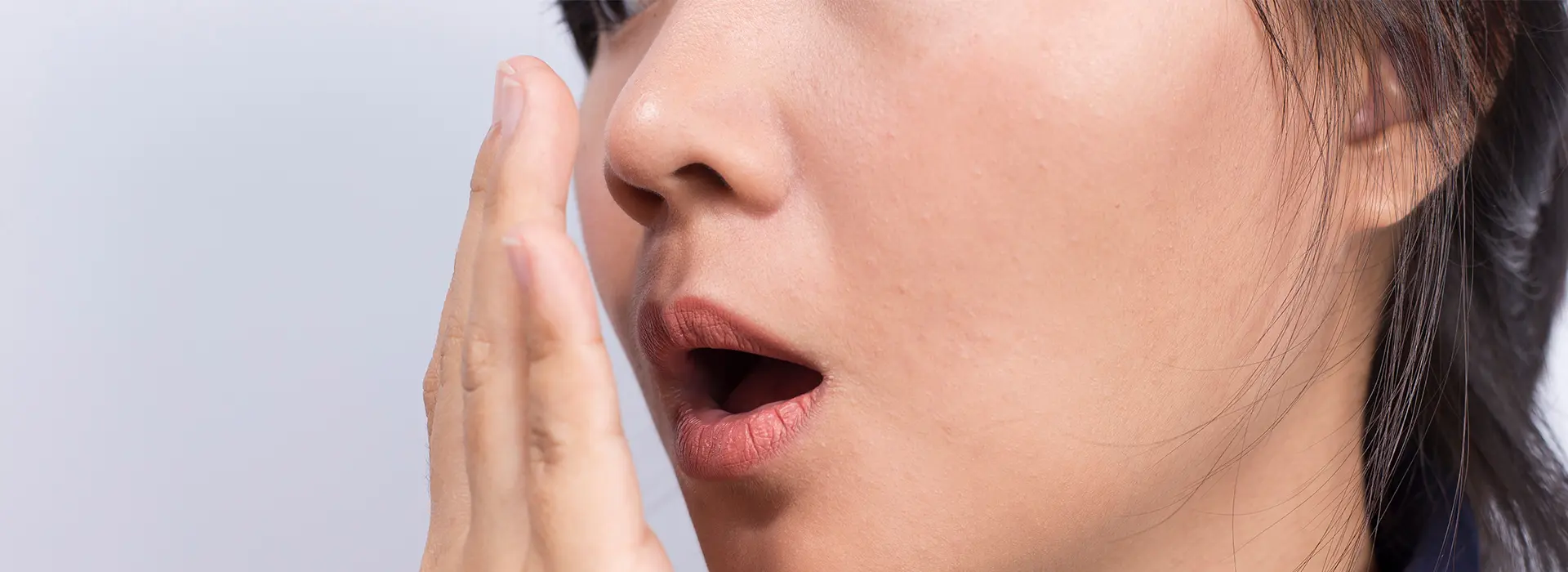Reviewed by Dr. Alan Baughman, DMD, MBA
Reading time: three minutes.
Few things make people more self-conscious than bad breath. It can affect daily conversations, social confidence, and even relationships. But is it something you can “catch” from another person or is there more to the story?
Table of Contents
Key Takeaway
Halitosis is not contagious. Bad breath develops from bacteria, oral hygiene habits, and health conditions unique to each person, and it can be managed with daily care and regular dental visits.
What Causes Bad Breath?
Halitosis is caused by an overgrowth of bad bacteria in the mouth. These anaerobic bacteria break down food particles and release sulfur compounds, which cause an unpleasant odor. The most common causes include:
- Poor oral hygiene: Not brushing or flossing allows food particles and plaque to stay on teeth and gums. This creates the perfect environment for bacteria that cause odor and increase the risk of decay and gum disease.
- Dry mouth: Saliva washes away bacteria, so when your mouth is dry, odor builds up faster.
- Gum disease: Infected gums harbor bacteria that cause persistent bad breath and can progress to periodontal disease if untreated.
- Certain foods and drinks: Garlic, onions, coffee, and alcohol leave lingering odors that chewing gum or rinsing may not fully mask.
- Medical conditions: Diabetes, sinus infections, gastroesophageal reflux disease, tonsil stones, and other bacterial infections can contribute.
Bad breath comes down to what is happening in your own mouth. It is not something you can “catch” from someone else.
| Where the Misconception Comes From Many people assume bad breath spreads through kissing or sharing drinks. While mouth bacteria can pass between people, they only cause problems if the other person’s oral health allows them to thrive. In other words, it is less about contact and more about the condition of your own mouth. |
But What if the Whole Family Has Bad Breath?
When several people in a household notice bad breath, it can feel like it is spreading from one to another.
In reality, the issue usually comes from shared habits or health factors. Families often eat the same strong-smelling foods, follow similar brushing and flossing routines, or have a family history of oral health concerns.
How to Prevent and Control Halitosis
Bad breath is usually manageable with consistent habits and professional care when needed:
- Brush and floss every day: Clear away food particles and plaque that feed odor-causing bacteria.
- Clean your tongue: Use a tongue scraper to remove buildup on the surface of the tongue.
- Stay hydrated: Drinking water keeps saliva flowing, which helps control bacteria.
- Rinse smart: Choose a mouthwash with antibacterial or fluoride ingredients.
- Chew sugar-free gum: Stimulates saliva and freshens breath between brushings.
- See your dentist regularly: Professional cleanings and exams are the most reliable way to maintain fresh breath long-term.
With consistent care at home and regular dental visits, halitosis can usually be prevented or kept under control.
Schedule an Appointment in Greeley
If you are concerned about persistent bad breath, the first step is a professional evaluation. At Clearwater Dentistry, we provide thorough exams and personalized treatment to address the cause of bad breath.
To book an appointment at our dental office in Greeley, CO, call (970) 515-3550 or visit us at 3110 67th Ave Pl, Greeley, CO.
FAQs
Most people with chronic bad breath cannot smell it on themselves because the brain becomes desensitized to their own odors. Friends, family, or a dentist are often the first to notice.
Bad breath is not passed down directly from parents to children. What can be inherited are conditions like gum disease, dry mouth, or reflux disease, which may increase the likelihood of halitosis if dental hygiene is not consistent.
Kissing someone with halitosis will not give you bad breath. Oral bacteria can transfer during close contact, but whether odor develops depends on your own oral health, saliva production, and habits like tongue scraping and regular cleanings.


